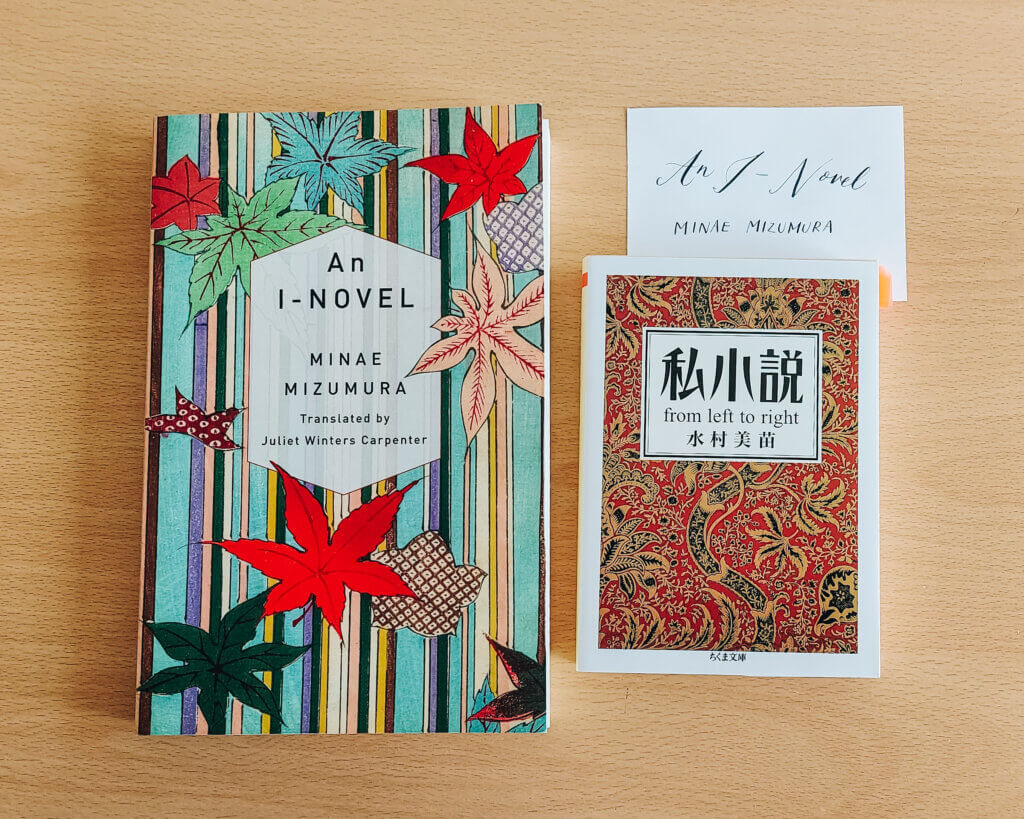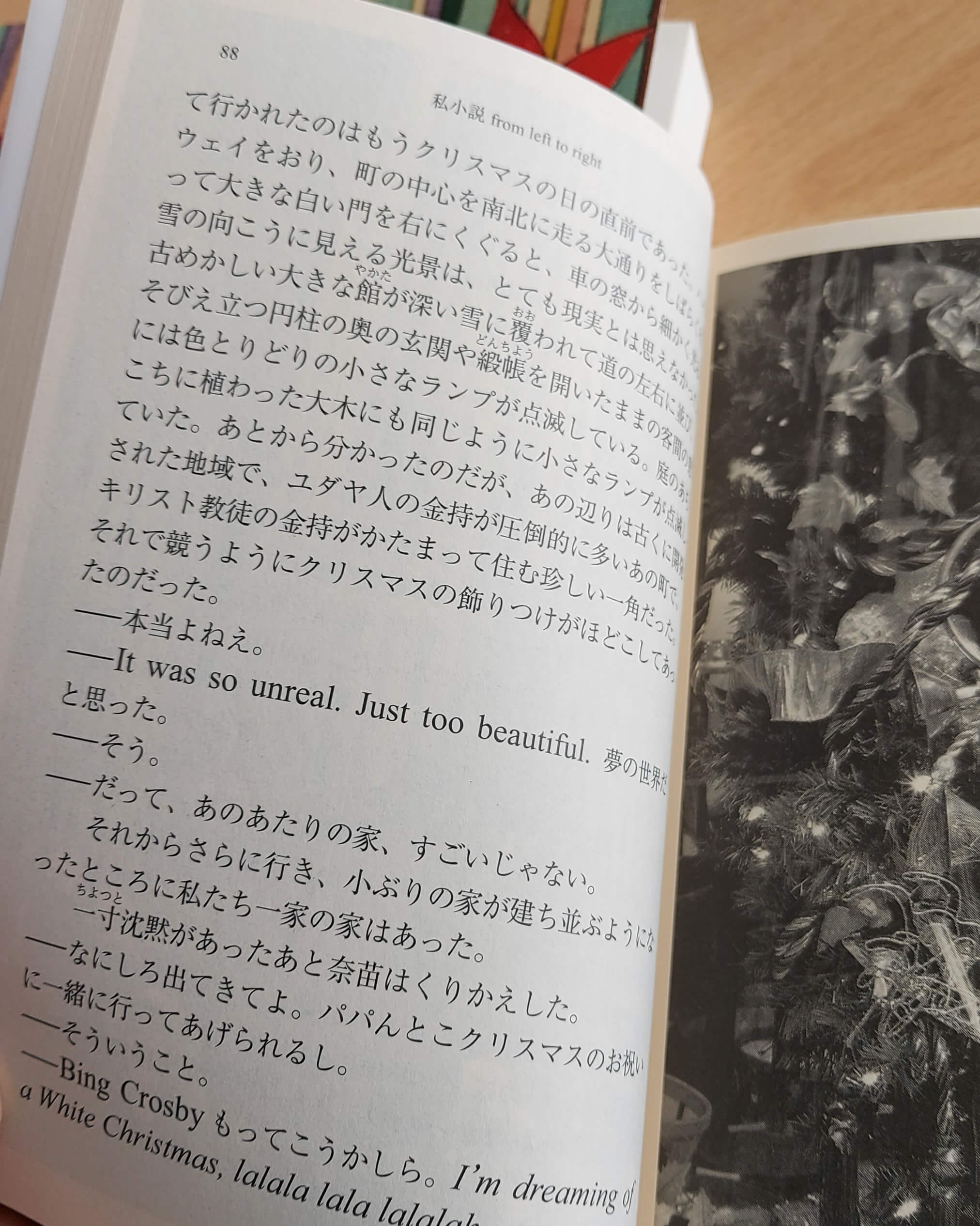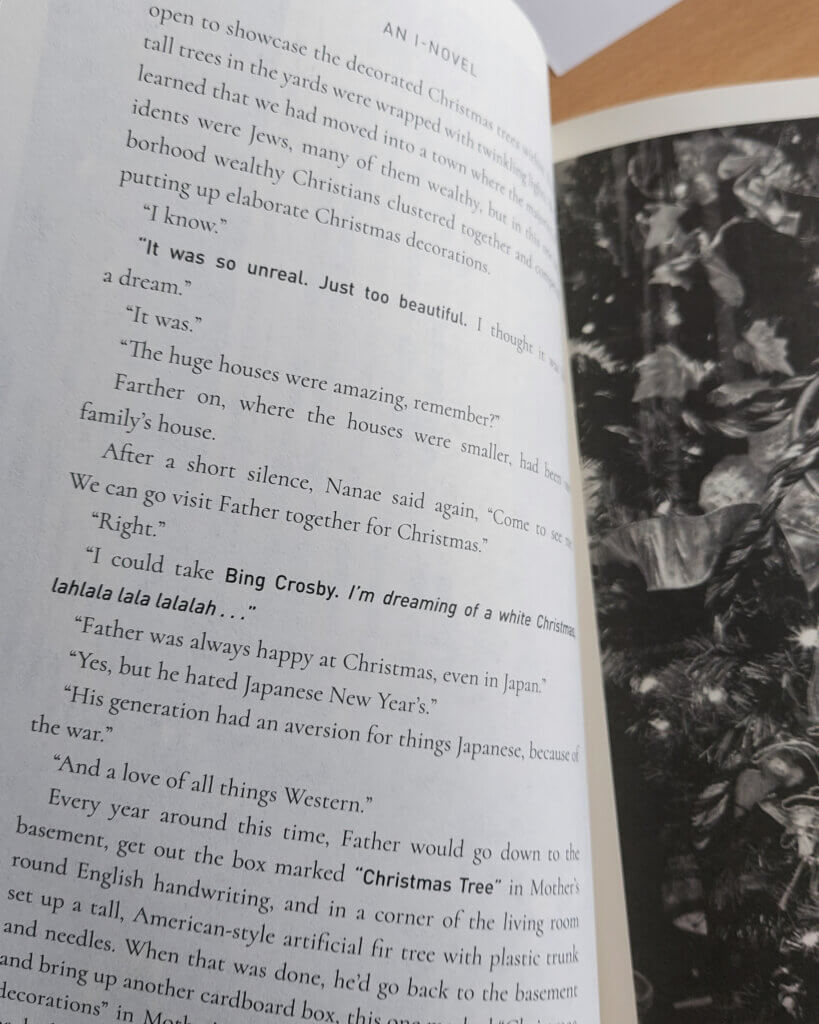
What does it mean to be a bilingual? How it would be like to grow up truly multiculturally?
‘An I – Novel’ was originally written in 1995, and as the title suggests, is a semi-autobiographical book.
「私小説」は1995年に出版された、タイトルにある通り自伝のような作品。著者の経験を元に書かれています。
The protagonist Minae is Japanese, but has grown up in the US since the age of 12 due to her father’s job. 20 years later – now in her early thirties, she is studying as a PhD student in a prestigious university. Feeling a deep sense of isolation and identity crisis in the US, she finds comfort in the world of Japanese literature. The book highlights the scenes that make up the critical moments in her life, while she begins to ponder whether she should finally return to Japan.
主人公の美苗は12歳の頃に父の仕事の都合でアメリカに移住。20年後の現在、30代となった彼女はPhDの学生です。強い孤独とアイデンティティ・クライシスに悩む彼女は、居場所を探すかのように日本文学の世界に没頭しています。この本は、そんな彼女の人生のターニングポイントと言えるような期間、「そろそろ日本へ帰ろうか」と悩む彼女の心情を綴っています。
In this manner she explores both her Japanese and American self, examining her difficulty of not fitting into either society well enough. As an Asian living away from Japan, even though my time abroad is much less than Minae has experienced, I really felt a strong sense of sympathy with this.
日本人である自分と、アメリカ的な自分、どちらの感覚もある彼女は、日本とアメリカどちらにも馴染めないと感じてしまう。私自身も、日本で育って移住しているので、(海外での生活は美苗よりずっと短いですが)美苗の気持ちには共感します。
Minae often calls her older sister who also lives in the US, chatting for hours and hours. This book mainly consists of conversations between the sisters, as well as Minae’s memory and thoughts documented in a ‘bilingual’ manner, with the language a mixture of Japanese and English. The English translation did a very good job to ‘bold’ the parts that were originally written in English in order to keep the feel of the original text.
美苗はよく同じくアメリカ暮らしの姉と長電話をするのですが、この本ではそんな姉妹の会話と、美苗の回想がコラージュのように行ったり来たり。しかもこれがバイリンガル表記で書かれているのが特徴的。会話やひとり語りの中でかなりの頻度で登場する英語、彼女たちバイリンガルの頭の中を覗き見するようで、読み物としてとても面白い表現方法です。
英語の翻訳版が出版されているのですが、英語版ではもともと英語の部分は太字で表現することで、翻訳箇所と区別しています。

The original title of the novel has the subtitle ‘left to right’ – this indicates the difference of this book compared to the usual way literature is presented in Japan. While Japanese books are generally read from top to bottom, this book is read left to right, like an English book. This really made the reading experience feel special and unique when I read the novel in Japanese for the first time. Unfortunately, some of these little nuances lose something in the translation – as admitted by the translator Juliet Winters Carpenter herself in the Translator’s note.
さらに、この本は横書きで書かれていますが、日本語版では「left to right」と副題も付いて強調されています。初めて読んだのは日本語版だったので、この横書きで、しかも英語が混ざっているという奇妙な読書体験がとても新鮮でした。
そんな読書体験は、英語版となると残念ながら1言語となってしまうので再現はできていないと感じるのですが、「この本には翻訳しきれない部分がある」と、巻頭の「Translator’s Note」内で翻訳者自身も言及しています。翻訳が難しい本をこうして出がけていること…翻訳家ってすごいなと、頭が上がりません。

Reading the English version had the effect of making me focus more on the characters. Because the reading experience ‘looks’ and ‘sounds’ so different in the Japanese text, I was enjoying the interesting flow of the literature more than the actual story, whereas the English version ‘normalised’ this aspect of the text by making the narrative monolingual, losing the emphasis on the bilingualism. This made me consider more about Minae’s ego and pride about her own circumstances. In particular the way she describes her sister, who seemed to be happier than her in the US. In the way Minae describes her childhood friends too, I almost felt she is a little bit too harsh at times, looking down in an almost snobby manner toward other people. Her nostalgia for Japan and family memories there as well as her rather stubborn selfish analysis of others really creates an interesting authorial voice – it seemed so honest. Minae’s melancholy monologue was very well captured in the translation as well.
英語版でも読んでみたことで、面白い発見がありました。
日本語で読んだ際には、見た目にも新鮮だった「バイリンガル」な要素に気を取られていたようで、英語版ではストーリーや登場人物に集中して読むことができました。特に美苗の生い立ちに関するエゴやプライドに気づかされたように思います。彼女が、自分よりアメリカに馴染んでいる様子の姉について語るときの言葉選び、子供時代の友人について語るときのどこか厳しくて、お高く上からモノを言うような視点にはびっくりしてしまう。なんだかすごく頑固でわがままな感じ…でも、そんな彼女が日本にいた頃の家族の思い出や、日本に感じるノスタルジアを語る姿がリアルで、胸に響きます。美苗のとってもメランコリーな語りは、英語版でも見事に訳されていました。
The English version also reminded me more about the context of the book, and its setting, which for the most part is the 1980s in the US. Despite Minae’s pangs of solitude, wrapped up in her indecisiveness, it’s worth thinking that she must have been one of the very ‘privileged’, otherwise she would not even have had the option to be indecisive like this. Her family, neighbours, friends, boyfriend and other Japanese people she encounters… The class she belongs to is reflected in her viewpoint of how she sees the world, and how she is seen both within the Japanese community and outside of it.
英語版ではこの本のコンテクストについても考えさせられました。この本の舞台は1980年代のアメリカ、美苗が孤独に迷い、優柔不断でいられるのは、彼女自身が恵まれた環境にあったからではないのかなと。彼女の家族、ご近所さん、友人、彼氏、彼女が出会う他の日本人… 美苗が彼らを語るその語り口が、彼女が属す「階級」を物語るようだったし、またそんな彼女を取り囲む人々の発言、そして日本人コミュニティや、それ以外の人もまた、どんなふうに彼女をみていたのか…彼女の言動から見えてくるようでした。
This was such a powerful book – putting you very much in the shoes of a bilingual and the complex worlds they see when you live abroad.
バイリンガルとして、異国に身を置くということを疑似体験させてくれるような、力強い1冊です。
- Columbia University Press (Translated by Juliet Winters Carpenter)
